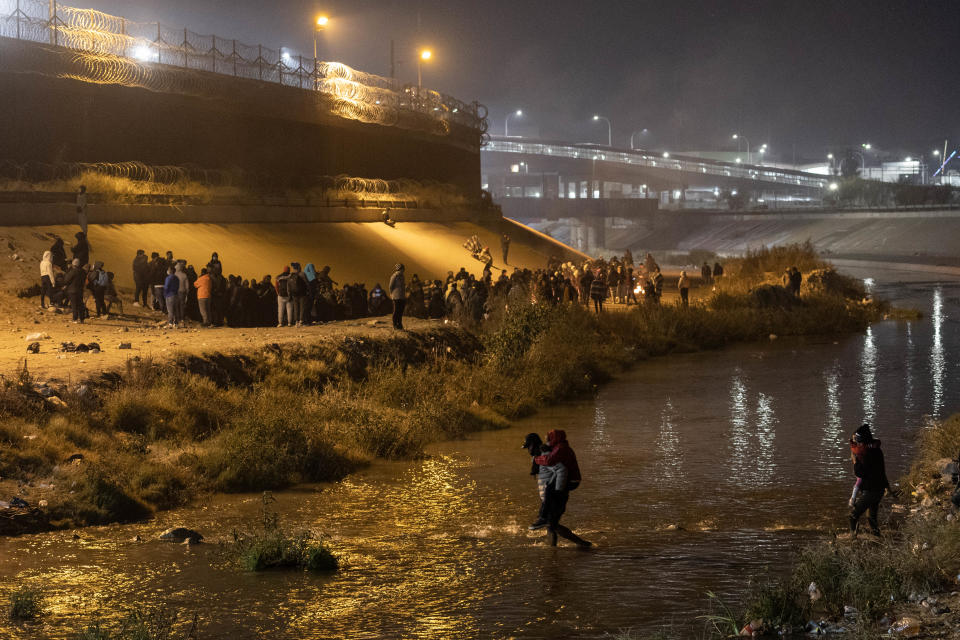Supreme Court blocks Biden administration for now from ending migrant expulsions under Title 42
- Oops!Something went wrong.Please try again later.
- Oops!Something went wrong.Please try again later.
WASHINGTON – In a blow to the Biden administration's ability to set the nation's immigration policy, the Supreme Court on Tuesday said the government could not halt the expulsion of migrants for public health reasons under the controversial Title 42 program.
That program, which has been in place since the early days of the COVID-19 pandemic, must continue while courts assess a lawsuit filed by Republican officials in 19 states who say that unwinding the Title 42 policy would unleash a national "catastrophe."
The emergency intervention from the high court came days after the Trump-era program was set to expire. The justices announced they will hear arguments about the program in the upcoming year, but limited their review to whether the conservative states may intervene in the litigation. Oral arguments are expected in February. In the meantime, expulsions will continue.
The high court's unsigned order noted that Associate Justices Sonia Sotomayor and Elena Kagan would have denied the emergency request from the states and allowed the administration to lift the Title 42 policy.
Associate Justice Neil Gorsuch dissented from the court's ruling Tuesday, joined by Associate Justice Ketanji Brown Jackson. The court's decision on the states' emergency request was "unwise," Gorsuch wrote. "The emergency on which those (Title 42) orders were premised has long since lapsed."
"The only plausible reason for stepping in," Gorsuch said, has to do with the states' concerns about immigration and the situation on the border.
"But the current border crisis is not a COVID crisis,'' Gorsuch added. "And courts should not be in the business of perpetuating administrative edicts designed for one emergency only because elected officials have failed to address a different emergency. We are a court of law, not policymakers of last resort."

While the decision was a legal loss for President Joe Biden, the political implications were less clear: The administration's effort to lift Title 42 has drawn sharp criticism from Republicans and uncertainty from some Democrats who fear border communities were not prepared for an influx of migrants. The Supreme Court's decision appeared to defuse that situation for now, even as it left thousands of migrants in limbo.
White House press secretary Karine Jean-Pierre said in a statement that the Biden administration would comply with the high court's ruling. She also said the administration is advancing its "preparations to manage the border in a secure, orderly, and humane way when Title 42 eventually lifts and will continue expanding legal pathways for immigration.
"Title 42 is a public health measure, not an immigration enforcement measure, and it should not be extended indefinitely," she added.
Title 42 permits Customs and Border Protection agents to expel migrants without the usual legal review to Mexico or to their home countries to prevent the spread of COVID-19 in holding facilities. Title 42 has been used to expel migrants more than 2.4 million times since its implementation in 2020 and has bottled up tens of thousands of migrants in Mexican border cities who are waiting to request asylum in the United States.
The Biden administration announced in April that it intended to wind down the Title 42 policy because vaccines and therapeutics had eased the impact of the virus. Separately, a federal court in Washington, D.C., ruled in November that the way the program was created violated the law and ordered the administration to end it by Dec. 21. That mandate was temporarily paused by the Supreme Court.
Border: El Paso readies for 'whatever happens' as humanitarian crisis persists
Appeal: Conservative states ask Supreme Court to keep Title 42 policy in place
Stay in the conversation on politics: Sign up for the OnPolitics newsletter
The legal wrangling set up a potential humanitarian crisis for the White House and sowed confusion on both sides of the border, where many migrants waited for word about whether they could seek asylum in the United States. Some migrants in Juárez told The El Paso Times they had heard the border would "close" on Dec. 21; others that it would "open." People staying in shelters shared stories of friends who had been expelled and others who had been able to stay in the U.S.
Debate over Title 42 made its way to the Senate floor Dec. 22, as lawmakers raced to approve a $1.7 trillion spending plan before the holiday weekend. Two last-minute amendments that would have extended the program failed.
Biden administration officials have said they have rushed resources to the border but have also called on Congress to spend more than $3 billion to speed up the processing of asylum claims and to move some migrants to less crowded facilities. "We need Congress to give us the funds we've requested to do this in a safe, orderly, and humane way," White House press secretary Karine Jean-Pierre said.
The president, meanwhile, will travel to Mexico next month to meet with Mexican President Andrés Manuel López Obrador, the White House said, and attend the North American Leaders' Summit. The long-running tension between Washington and Mexico City over migrants traveling through Mexico to the U.S. is certain to come up.
Contributing: Lauren Villagran, El Paso Times; Rebecca Morin, Sarah Elbeshbishi, Francesca Chambers, Maureen Groppe.
This article originally appeared on USA TODAY: Supreme Court blocks Biden from ending Title 42 migrant expulsions

